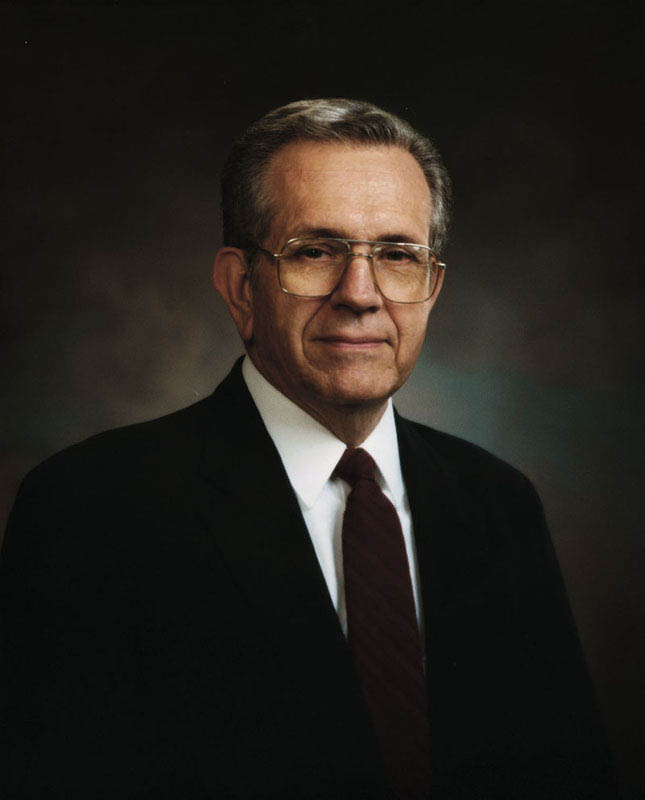Boyd K. Packer, an apostle in The Church of Jesus Christ of Latter-day Saints, shared a story about goals in his book, “Memorable Stories With a Message.” A high ranking Mormon leader, he encourages people to set goals, whether at the new year, or any other time.
At a New Year’s Eve party, the host asked the guests to write on a sheet of paper what they hoped to accomplish in the year to come. Each guest did so and sealed and labeled the envelope. The host took the envelopes to his bank and placed them in a bank vault until the following year.
Elder Packer quotes Heber C. Kimball, who said, “I have said often, “you may write blessings for yourselves, and insert every good thing you can think of, and it will all come to pass on your heads if you do right.”
 Elder Packer and his wife had listed six things they hoped for, all for others and all seemingly impossible. However, because they had written those things down, they periodically prayed for them to come to pass. Each time they prayed, they received personal inspiration that allowed them to further their goals. He noted that they would likely have ignored or not received those inspirations if they had not set down a goal. Five were accomplished, and on New Year’s Eve the next year, they learned the final goal had been achieved by the friend they had been praying for. Although he knew nothing of the goal Elder Packer and his wife had set, he happily informed them the serious challenge faced had been resolved (Packer, Boyd K.. “A Host of Goals.” Memorable Stories With a Message. Salt Lake City: Deseret Book Co, 2001. 7-8. Print).
Elder Packer and his wife had listed six things they hoped for, all for others and all seemingly impossible. However, because they had written those things down, they periodically prayed for them to come to pass. Each time they prayed, they received personal inspiration that allowed them to further their goals. He noted that they would likely have ignored or not received those inspirations if they had not set down a goal. Five were accomplished, and on New Year’s Eve the next year, they learned the final goal had been achieved by the friend they had been praying for. Although he knew nothing of the goal Elder Packer and his wife had set, he happily informed them the serious challenge faced had been resolved (Packer, Boyd K.. “A Host of Goals.” Memorable Stories With a Message. Salt Lake City: Deseret Book Co, 2001. 7-8. Print).
Unless we set goals, we risk roaming through life without ever really accomplishing anything meaningful. It can be easy to get caught up in the pace of life and the immediacy of issues and never really plan our lives. Making a goal, writing it down, and setting a deadline can help us accomplish everything God sent us to do, resolve problems, and even bless others. When we add prayer to the plan, we insure that God’s will can be carried out for us.
The first step to planning the coming year is to pray for inspiration. We usually have a good idea of what we want, but sometimes God has another plan and His is always better. We want to be sure our plans are aligned with His.
Next, we should decide what we want to have happen in our lives. I spend time picturing my life one year from now and then write down what has to happen to bring that picture to life. I try to be sure my vision is realistic—I can’t be a best-selling novelist by next year if I’ve not even written a book, or have no idea how to write one. I also work to keep the number of changes I have to make under control. No one is going to keep 100 resolutions, but we are likely to keep five manageable resolutions.
The next step is to write them down. If they aren’t written, they probably won’t happen. Decide where the resolutions will be kept for the coming year.
For many people, this is the end of the process. However, if this is all the planning that occurs, the resolutions will be broken or forgotten in a few weeks. Each resolution needs its own plan.
A goal must be broken down into manageable steps. “Write a book” is a huge goal with many smaller steps involved. Plan each step and create a timetable for accomplishing it. If your goal were to write a book, you might first need to learn how to write a book. Write that down as the first step and then research how to learn. What books will you read? What friend will you meet with for advice? How long do you need to do this?
The next step would be to choose the topic of the book. Will it be fiction or non-fiction? What will it be about? You may not know the entire outline of the book, but you do need to know what type of book you’re writing so you can study the correct preparation materials.
After this, the prospective writer would need to decide how long the book will be and then figure out how many pages he has to write each day to accomplish it in one year. Since writers are usually reminded that they need only write a page a day to finish the first draft in a year, the goal-setter might decide to write two pages a day, to allow for Sabbath breaks, holidays, sick days, and the preparatory learning.
Continue in this fashion until you know what steps are needed to complete your goal and you’ve created a timeline for achievement. You’re now well on your way, but you still aren’t finished.
When are you going to work on this goal? If you’re planning to read the complete works of Shakespeare this year, will you read in the mornings, before bedtime, or during your lunch hour? If you don’t choose a time and clear your calendar, it won’t happen. You’ll get busy and you’ll climb into bed at the end of the day still not having found a free hour to read.
What will you do if you break your resolution or fall behind schedule? It is at this point most people give up. You can help to prevent this by planning in advance how to handle it. If you decided to read the Old Testament this year, will you take on extra reading to catch up, or simply continue reading the planned number of pages each day and redo the schedule, so you finish after the end of the year—but you do finish? Will you re-evaluate your plan to see if it was realistic and rework it to meet the reality?
There are times when it is appropriate to abandon a goal. If you’ve decided to return to college, but a child becomes seriously ill, the child will naturally come first. This is not a failed goal. You have prioritized the conflicting challenges of life and made the proper choice. Sometimes, while praying, we learn we need to put a goal on hold or abandon it all together. When my children were younger, I began a freelance writing career. When things changed and I began homeschooling, I was warned during a prayer that I could not handle both my writing career and homeschooling. Many people do, but I wasn’t one of them. I put the goal, pursued with Heavenly permission, on hold for eight years until prayer revealed it was time to restart. The start I had made many years before made the new developments in my restarted career possible, so it wasn’t a failed goal at all—simply an altered timeline after consultation with God.
When goals are approached prayerfully, and prayer is a regular part of the year’s plans, it is very likely we will achieve our goals, or be aware of what God wants us to do in relationship to them. God wants us to achieve our righteous dreams, and when we live worthy of His help, and we choose goals He approves of for us, we can do and become everything He wants us to become.
About Terrie Lynn Bittner
The late Terrie Lynn Bittner—beloved wife, mother, grandmother, and friend—was the author of two homeschooling books and numerous articles, including several that appeared in Latter-day Saint magazines. She became a member of the Church at the age of 17 and began sharing her faith online in 1992.






